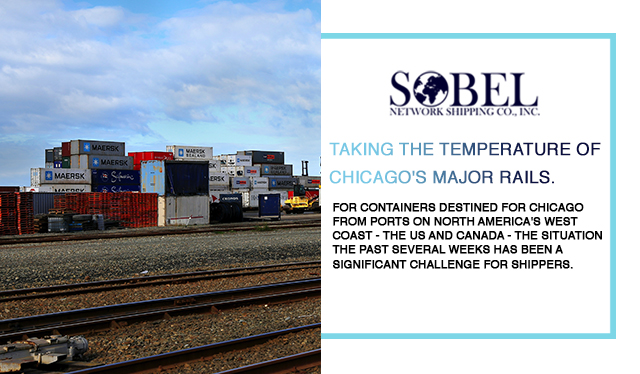For containers destined for Chicago from ports on North America’s west coast – the US and Canada – the situation the past several weeks has been a significant challenge for shippers.
Let’s start with the Union Pacific who took the drastic step of embargoing all eastbound containers last week from four ports of arrival in an effort to unbury their Joliet, Illinois, ramp. They maintained acceptance of domestic intermodal containers, but all ocean containers were held at the ports of arrival.
This week, the UP is again allowing traffic to flow eastbound, albeit in controlled, metered amounts.
From the Journal of Commerce (subscription required):
UP said it began running trains from Los Angeles, Long Beach, Oakland, and Seattle-Tacoma to the Global IV terminal in Joliet, Illinois, on Sunday at “controlled levels” to avoid overwhelming the Midwest hub with cargo that has been sitting at the ports for a week.
“We will continue to look for ocean carrier support and engagement with shippers to outgate both carrier haulage and merchant haulage shipments to maintain fluidity,” the railroad said in a statement to JOC.com. “Union Pacific will continue to monitor and adjust eastbound volumes to Global IV based off the pace of outgates and available chassis supply.”
At the BNSF, things haven’t been much better, especially as shippers have grown so angry at the amount of demurrage and detention being paid that the federal government through the Surface Transportation Board is stepping in and asking rails some questions about the practice.
As of August 2nd, the BNSF announced a change in their storage policy in Chicago, designating Chicago as a Group 1 facility for the purposes of calculating free time which means it is now the day of notification plus 24 hours before storage begins. They are also increasing storage beginning on the fifth day to $500 per day.
This announcement from Evergreen Line has the details.
Midwest destinations like Chicago can also be served via Canadian ports such as Vancouver and Prince Rupert, and wildfires have caused a logjam of containers at the port that have left containerships at anchor unable to discharge their cargoes like what has been seen in Southern California.
Our focus at Sobel Network Shipping is to continually communicate market conditions and changes to our customers to allow them the maximum amount of time to adapt their business practices. With the Port of Los Angeles sounding the alarm of eroding metrics as the impending peak (peaker?) season approaches, we will continue to share these updates and do our best to work within the confines of the situation to ensure maximum velocity of containers.


